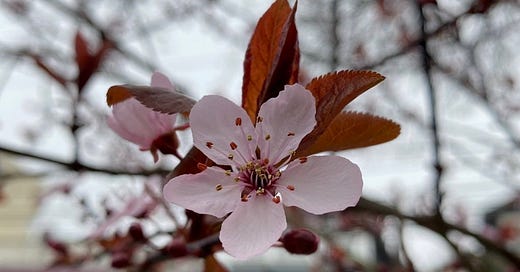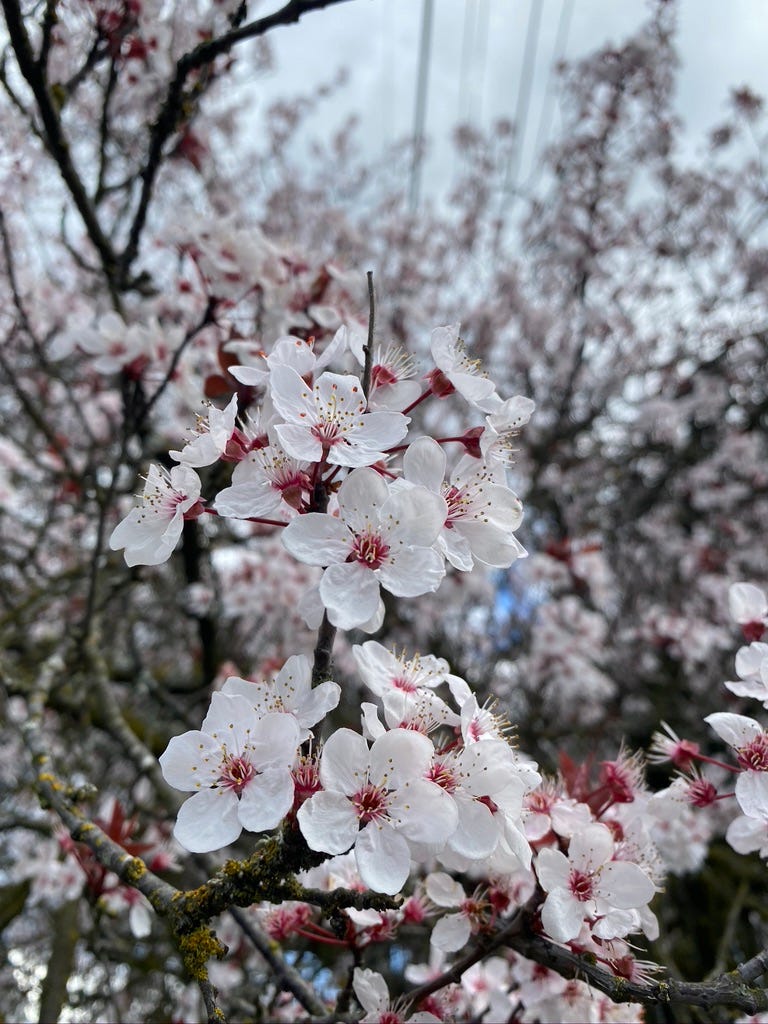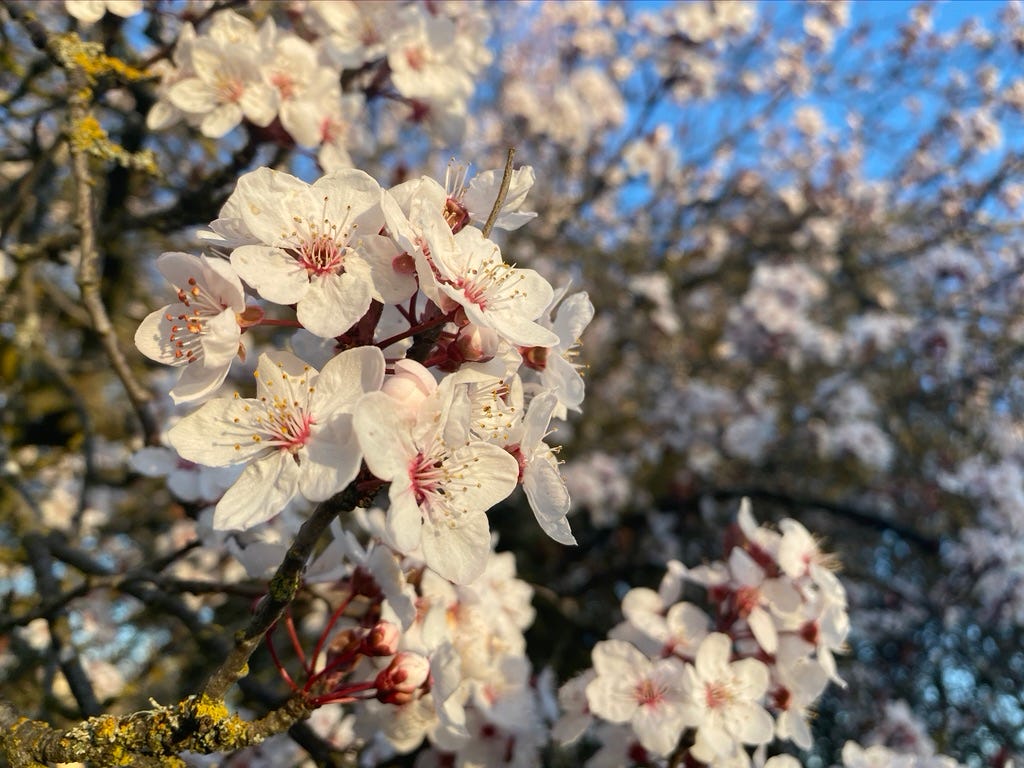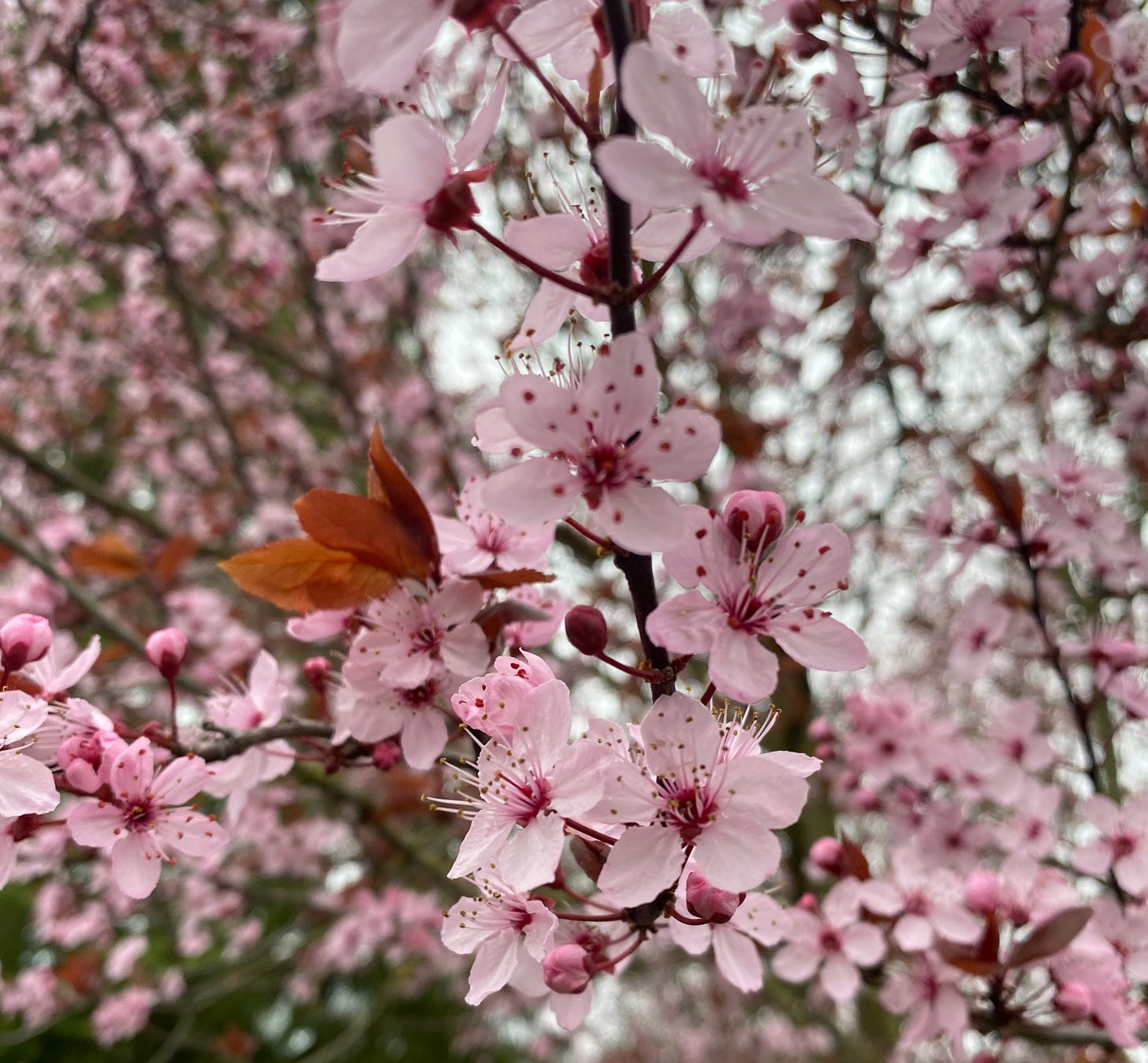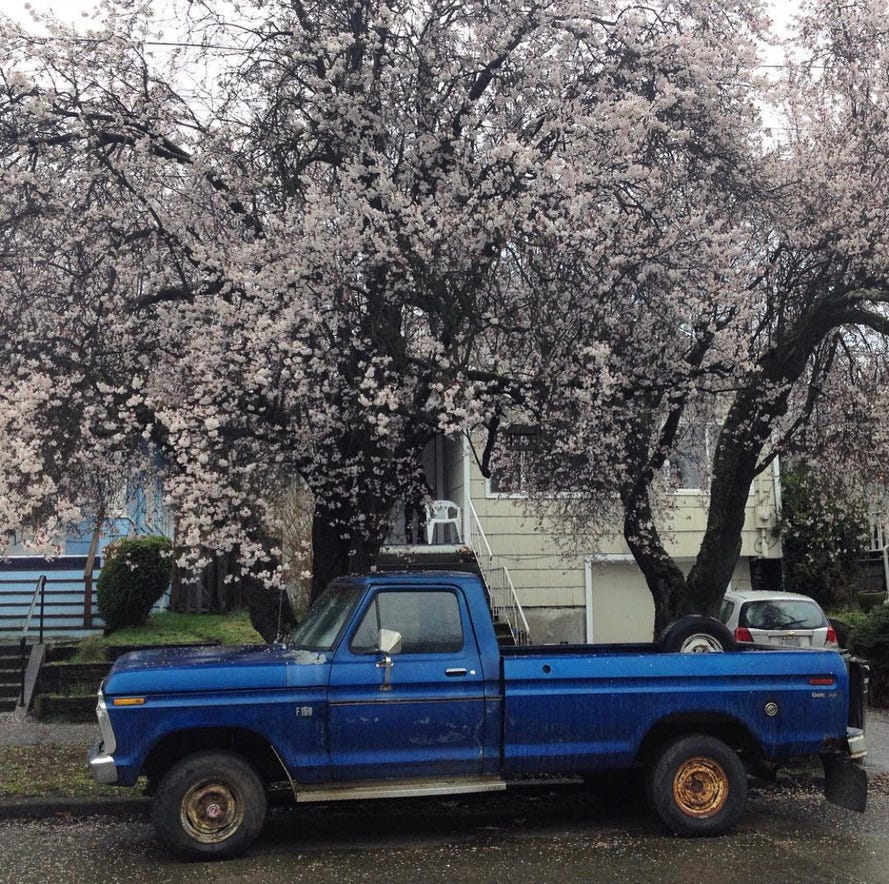Cherry Blossom Season Is Over
Some thoughts on the necessarily fleeting nature of beauty, and some personal news.
In late winter each year, the bare cherry trees begin to show their first blossoms. Sunny February days are a rarity here in Seattle, but we usually get one or two, and it seems like it’s always on one of these days that the first pale pink blooms unfold delicately from the buds that have stored them through the cold and drizzly months.
This has long been one of my favorite things about living here. Our winters lack the bite of other places I’ve lived—the driving snows of the northeast, the icy winds of the midwest—but they are long and gray and quantifiably miserable; the skies here are so well-covered that our bodies don’t get enough Vitamin D. But the emergence of the cherry blossoms each year is the first sign that our annual gloom has an end in sight. A defiant show of warm color against the gray.
Have you ever tried to pluck a cherry blossom? They’re impossibly fragile things. Not the kind of flower you can pick and take home with you and admire. (Trust me, I’ve tried a few ways.) But I think their beauty is their fragility. Their living reminder that all things—winter, warmth, life—are fleeting, and as such should be drunk in and appreciated to the fullest for as long as we have them. Cherry trees—like their early season counterparts magnolias and dogwoods—are hysteranthous, meaning their flowers come before their leaves. The dendrological reasons for this order of events are above my pay grade but it is no mystery to me why cultures plant them all over the world: in their delicate petals is the promise of spring. In parts of Seattle they are so numerous that it feels almost decadent to sit and stare at them for too long. But I do it anyway, because it’s this overdose that carries me through the next long period without them.
Cherry blossom season only lasts a few weeks. That’s another reason I don’t mind overdosing on the views, don’t feel weird or guilty taking new pictures of them almost every single day. It is here one day and the next, after the hard rains and strong winds of late winter come again, it is snatched away.
As I write this, on a cold and windy April afternoon, there are still a few bushy cultivars hanging on in my neighborhood, but cherry blossom season is mostly over. Drifts of petals like pink snow are piled against the curbs, strewn in the yards, caught in the branches of other trees. Green leaves have erupted from behind the white flowers of the sweet cherries; reddish-purple ones have taken over the cherry plum trees that dominate my neighborhood. (These leaves still photosynthesize; chlorophyll is still present, but its color takes a backseat to the darker tones of the leaves’ anthocyanins.) There might still be plenty of blossoms hanging on where you are, I don’t know. But either way the magic of that first hopeful gasp has passed, as it always does, as it’s meant to.
Cherry blossom season ends for very good biological reasons, not just airy philosophical ones. The flowers must emerge and be pollinated so the tree can bear fruit; the leaves must take their place so the tree can feed itself. What is bright and fleeting must give way to what is steady and durable, so that what is bright and fleeting can be renewed again.
I am torturing this metaphor by way of alluding to some personal news. After nine years here in Seattle, my wife and I will be moving to Detroit at the end of this summer. We are beyond excited for what we have planned in this next chapter, even as we are preemptively grieving all that we will be leaving behind. We’re in our thirties now and we called this place home for most of our twenties, those bright and shining years where everything feels new and possible. We have climbed mountains together, literally and figuratively; we have explored the woods and the water and the city in every way we knew how; we have been found and loved by too many incredible people to count. I know it sounds trite but I mean it with every fiber of my being: we haven’t just made friends here, we have made a family, which is its own story too big for this newsletter to hold.
Recently Helena Fitzgerald wrote, of a formative night at a favorite bar that just closed,
Nothing happened that night, and for ten years afterwards we talked about that night when nothing happened. We tell our lives to one another through little stories like these, nights where nothing happened and not much actually mattered.
Many of my longest-lasting Seattle friendships have their foundation in similar stories, in delirious evenings in the cozy din of Kate’s Pub or the original Octopus Bar or on the soft mismatched couches at Murphy’s, in dazed nights in the neon glow of Add-A-Ball or the pizza fumes of Dino’s. And from those first improbable moments has sprung something altogether magical and wonderful: a group of people with whom I can bare my truest self, with whom I have celebrated life and grieved losses and learned how to love myself and other people a whole lot better.
A few years ago, when I first started noticing and appreciating the cherry trees, I took a picture of a cool old truck that had just parked beneath one. Six months later, with the blossoms long gone, the truck still hadn’t moved, rusting on soft tires. “You froze it in time when you took that picture,” joked my friend Chris, one of the people I will miss most, on our way to Lighthouse Roasters, the coffee shop I will miss most.
Of course he was right, in a way. That time is fixed forever in my photograph, a souvenir of a moment none of us will ever return to. I am tempted to say, “Would that it were so simple to freeze time otherwise.” To hold still, for a little while longer, in all those sunny afternoons and crowded bars and intimate conversations that have been among the great joys of my life thus far.
But to do so, in the end, is to ignore the lessons of the cherry blossoms.
Thanks, as always, for reading. I’ll talk to you next week.
-Chuck
PS - If you liked what you read here, why not subscribe and get this newsletter delivered to your inbox each week? It’s free and always will be, although there is a voluntary paid subscription option if you’d like to support Tabs Open that way.
PPS - Tomorrow somehow marks two years since I published my first book, A Good Place for Maniacs: Dispatches from the Pacific Crest Trail. If you’d like to read more of my writing, you can find it online wherever books are sold, or at the link below.

